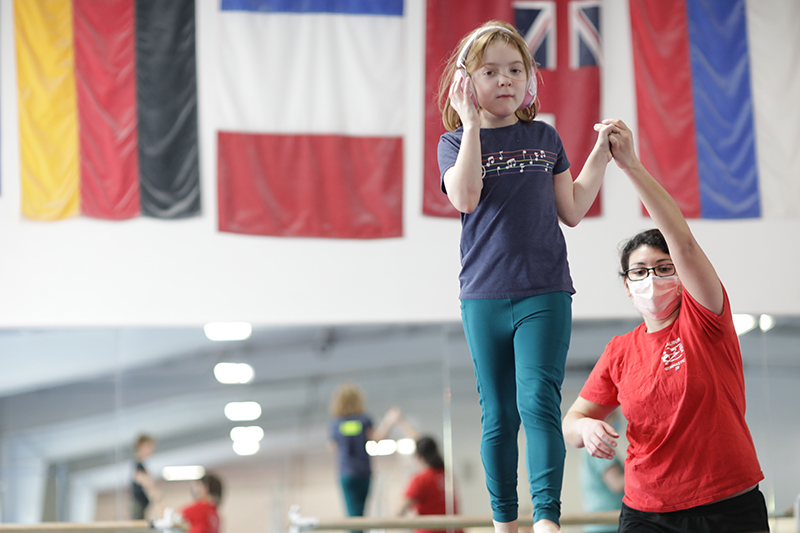Flipping the script

At first glance, seeing children tumbling on a gym mat or jumping on a trampoline might not seem like a big deal, but for the parents surrounding the mat on Sunday mornings at Excalibur Gymnastics in Virginia Beach, it’s everything. Their children are participants in Adaptive Gymnastics, an EVMS Community-Engaged Learning initiative developed for young athletes with neurological, physical or developmental disabilities.
Kaitlin Hardy, MD Class of 2023, was inspired to create the program after her career as a competitive gymnast came to an abrupt end.
“I was a gymnast for my entire life and reached my goal of NCAA Division I gymnastics, only to have the experience taken away from me when I began having epileptic seizures,” Ms. Hardy says. “As a coping mechanism, I started working with young people in the community with epilepsy and eventually expanded my interests and began working with children with neurological and intellectual disabilities.”
When she arrived at EVMS in 2019, she wanted to continue that work but couldn’t find any similar programs. She reached out to Excalibur gymnastics, pitched the idea and launched the initiative. When she approached EVMS Community-Engaged Learning about supporting the effort, the group was eager to help and make it an official student initiative. In just two years, the effort has grown from four participants to 40 across three classes.
In February 2022, the group hosted a competition at the Virginia Beach Convention Center.
Student volunteers come from both EVMS and the ODU Pre-Health Club. After completing the USA Gymnastics Safe Sport course, they undergo training and are assigned to a specific athlete. Every family fills out a plan for their child, and then the student volunteers work toward creating specific goals for the children. Goals range from learning physical therapy- and occupational therapy-based skills to developing both social skills and the ability to follow multistep directions.
Karen Basanes was thrilled to learn about the new program. Her 12-year-old daughter, Deja, who loves dance and gymnastics, was diagnosed with Autism Spectrum Disorder eight years ago. The family tried several different gyms but left every session feeling like the environment wasn’t a good fit. Since starting with Adaptive Gymnastics, they’ve seen vast improvements.
“We joined the program to help Deja with her physical strength, coordination and social skills,” Ms. Basanes says. “We have seen improvements in those areas, as well as speech, self-confidence, awareness, emotional and behavioral aspects. My list could go on. She benefits from something in every class she attends.”
While the program is beneficial to the athletes and their families, it’s also a great experience for the student coaches. The goal is to give EVMS students a unique experience in pediatrics, insight into living with disabilities and a chance to explore the benefit of sport in childhood development.
“Through this program, I have learned so much about empathy,” Ms. Hardy says. “I’ve also learned how to tactfully navigate discussions, set realistic goals and work with caregivers.”
“Through this program, I have learned so much about empathy. I’ve also learned how to tactfully navigate discussions, set realistic goals and work with caregivers.” Kaitlin Hardy, MD Class of 2023
Parents of the participants say they are thankful for the opportunity.
“These volunteers give their time, effort and, most importantly, patience in helping our children,” Ms. Basanes says. “It’s one thing when it’s your own child with special needs, but they are taking the responsibility and dedication to help another individual. That’s a heavy role not everyone is willing to take. We need more people like them in our community.”
Read more magazine stories from issue 14.2 or read stories from past issues.
Subscribe to receive free copies of EVMS Magazine.
Subscribe